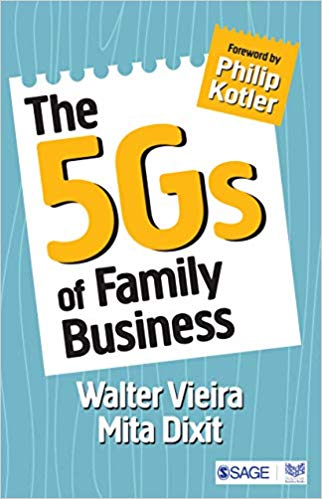
How can a family owned business survive from generation to generation in a world that is changing at such a rapid pace? Walter Vieira and Mita Dixit delve into the dynamics of family businesses in the modern times. They crystalize years of research and experience in consulting family businesses, into a single book, The 5Gs of Family Business (Published by SAGE Publications). The book provides nuggets of information and sound analyses that would be relevant for entrepreneurs who are a part of the unique family business ecosystem in India. Packed with case studies, easily implemented formulas and some interesting stories, The 5Gs of Family Business is a light but impactful read.
Bookedforlife chats with Dr. Mita Dixit about the book, delving into themes like conversion from a traditional to contemporary mindset and more takeaways for readers…
The book talks about ethics as the cornerstone of the longevity of a family business. What are some of the tried and tested ways by which this transmission can be done?
Ethics is an individual’s willingness to do the right thing even if it is hard or risky. When business families apply their sense of doing right by following ethical practices, they become wealth creators and employment generators of the country. Not only in the business but also in family relationships, ethics is the foundation of trust and harmony.
In our book we have quoted several examples of business houses like Tata, Godrej, Murugappa which are admired as ethical businesses in India, and have been going strong since four or five generations. One of the core reasons for their success is, that the founder family’s values are followed by the generations and ethical practices are the part of the family and organization cultures.
How can family businesses transmit their ethics to the next generation?
Ethics are moral values in practice. Values such as honesty, hard work, respect, sacrifice for larger good have to be taught to children, not forced upon them or on the organization.
One of the sure-shot ways of transmitting ethics starts with the family. Genesis of ethical behaviour is in ethical parenting. Children learn by observing parents, their language, customs, ideals, and the way they treat others, and take decisions. When they grow up to become successors, their upbringing reflects in the way they lead the business.
Another way of transmitting ethics in the family business is creating a culture of Governance. It is the key to build and sustain a robust family business. Both, at family and business fronts, governance is necessary. For owner families, it means, the family has a unified vision and well-defined policies on family’s involvement in the business and a Code of Conduct. Well governed families give importance to meritocracy rather than entitlement in selecting their successors.
Family’s governance practices percolate down to the organization in terms of clearly defined dos and don’ts, systems and processes, focus on performance, fairness and transparency in dealing with employees and stakeholders. When family businesses are well governed, they are bound to sustain for a long time.
You trace the development of the family business in India, especially since independence right into the new millennium, and how successful business houses have been agile through the varied social and economic challenges in the country. In today’s times, what in your experience is the number one challenge that family businesses face?
Having studied the journey of almost 75 years of Indian family businesses, I find, today one of the most daunting challenges for owner families is of succession, passing the baton to the next generation. In our globalized economy, the family business landscape has changed. Many forward-looking family businesses are professionalizing their work culture and adopting digital ways of business. They are focused on quality and performance. Yet, the challenge of attracting their gen-next in the business and training them for leadership is still overwhelming.
The gen-next millennials are fast, educated, impatient, and independent. They are tech-savvy and more exposed to the world than their seniors. To attract them to join the family business and take it to the next level is a tough task. I observe several trends: one trend is, gen-next members want to pursue their career in the field of talent they have. For example, art, music or become a start-up entrepreneur. Another trend is opting for a lucrative corporate career instead of working in the less charming family business. One more reason I come across is youngsters avoid working in their family businesses as they find the business scope is low, or work culture is too traditional, or the family environment is confined and conflict prone.
I tell business families that if they want children to work in the business, then they must cultivate a sense of pride in them about the business since a young age. Expose them to the business environment and motivate them to get good education, develop leadership skills to take the business to new heights in future.
There is also an emerging trend where business owners/families are willing to accept non-family professionals as successors. In the era of mergers, acquisition, and private equity, for owner families, it is wise to separate their ownership from management and let the capable leaders manage the business.
Could you throw light on the concept of family constitutions? You have talked about the same in the book.
Family Constitution is the manifestation of family governance, the culture of best practices. It is a vast subject, but I will give my pointers related to the family aspect. Same is the case with business owning families. Some members work in the business and some don’t, especially women. Some members have ownership rights and some don’t. Those who work in the business have different capabilities and contribution. Their roles, authority, and personalities vary. Wealth is of course an important underlying factor. In this complexity, family’s aspirations and business objectives tend to clash.
Therefore, mature and wiser families draw out clear cut guidelines, policies, and norms on the family’s ownership and control in the business. These guidelines and policies when documented, becomes a Family Constitution. There are various mechanisms to actionize the Constitution like making a family council to take all major decisions or resolve disputes. I would say, for any family business to sustain over a longer period, harmony in the family is a must for business to prosper and business prosperity is a must to keep the family united and cohesive.
A word of caution, I must say that developing a Family Constitution is a serious project and requires certain skills which family members may not possess. Therefore, it is important to appoint non-family experts and family business advisors to develop the Constitution and help the family to implement it.
How would you suggest entrepreneurs approach the book in order to gain maximum benefit from the same which they can directly apply to their family businesses?
In The 5Gs of Family Business, we have developed the framework of 5Gs… genesis, growth, gen-next, governance, and giving back. These are essential elements for success of a family business. Genesis is the origin, the entrepreneurial aspect of the business, the raison d’etre of the business venture. The book is written in a simple, fluid manner without preaching. We found from a survey that business owners prefer to learn more from other’s experiences rather than reading heavy concepts and theories.
I would say, for entrepreneurs, reading the book will be an interesting and engaging way to learn about what causes success and failure of businesses, what are ethics and best practices, and which are the essential elements that make their businesses last longer than their own generation.
Harmonious family relationships and management of family dynamics in an efficient manner is important for the longevity of a family business. Could you site any famous examples where this is evident on practice?
There are several examples of family businesses where the families have developed governance mechanism such that the family bonding are strong, individuality is respected, and the business is managed in a professional manner. Take the example of Godrej family, or Murugappa group. We have not seen any news headlines about these families having differences and disputes. For longevity of the business, many families have taken up the role of the investors and the guardians of values in the business, and left management of business in the hands of competent professional.
In recent years there has been a move towards professionalizing the family business. You mention in the book that this has been the result of economic liberalization. You also say in the book that “Business decisions are not influenced by the family’s personal agenda”, in such cases. Do you believe that the practice of professionalizing the family business is here to stay in the context of the country? Is it a longer trend? Or is it an evolutionary factor that will be a part of the fabric of the family businesses in the country in the future?
While I was doing research for the book, I learned that an important reason of sustainability of family businesses in the western world is their professional work culture. As I mentioned earlier, the business has to prosper to stay alive. Good management practices, objective decision making, innovation, and long-term vision are the components of professionalization.
When needs and desires of families overpower business decisions, professionalism is compromised. I see that the younger generation is more rational, performance oriented, and less emotionally attached. Take the example of Flipkart and other recent businesses. The founder owners believe in creating a value and moving out of the business to start another venture. So, the life span of businesses is reducing. Family business DNA is changing and professionalization is going to be the part of the DNA. It is not just a fad or a trend.
We are slowly seeing examples of gender equality in the family business context, which earlier on used to be largely male dominated. Based on your experience what is the direction you see Indian family businesses adopting when it comes to the involvement of women in business operations actively?
I should say I am very happy to see more women are joining their family businesses and playing decision making roles. About 10 years ago when I was doing my doctoral research on family businesses, I would hardly come across women playing significant roles in their family businesses. Today, women have truly empowered themselves and they perform fabulously in their businesses or even at the corporate level.
However, the progress is not enough. We have a dearth of women leaders, women on the Boards, and women entrepreneurs. Almost 80% of India’s businesses are family owned and managed. Number of businesses would go in millions, whereas women in leadership positions would be in few thousands.
In family businesses, traditionally women have been playing the roles of home makers and family’s care takers. But the times have changed drastically. Thanks to globalization and media. Women are considered at par with men and not a weaker gender. With social paradigm changing to nuclear families, the number of potential successors in families are also reducing and typical gender-centric roles are changing fast. I think, these social changes are quite favourable for women. There is a tremendous scope to utilize their talents and intelligence in family businesses. Only a missing factor is training which gives confidence and skills.
Indeed, the dynamics of the family business will change in response to the changing scenarios. The 5Gs of Family Business by Walter Vieira and Mita Dixit is a worthy guide that will help family business owners to get a deeper insight into the ever-changing scenarios that impact the institution of the family business.
Title: The 5Gs of Family Business
Author: Walter Vieira and Mita Dixit
Publisher: Sage Publications
Genre: Non-Fiction/ Business




